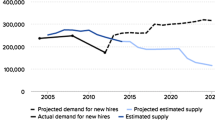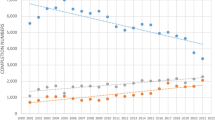Abstract
Since the independence era in the 1950s and 1960s, many African countries have recognised the important role that science plays in the socio-economic development of any country. As a result, various African governments have enacted policies and allocated a large proportion of their gross national product to the science and science education sector of the economy. For instance, many African countries introduced universal primary education and to cater for the bulging student population increased the number of their secondary schools considerably. However, the rapid expansion of educational facilities has to some degree compromised the quality of the science teaching in many African schools. Among the various problems facing science education in Africa since the independence era, however, the most frequently mentioned has been the shortage of qualified science teachers. Science teachers play a critical role in laying the foundation of scientific literacy of a country. Indeed, no education system can outperform the quality of its teachers.
Similar content being viewed by others
References
Bajah, S. T. (1975). Scope and dimension of Science curriculum improvement in developing countries, with particular reference to Nigeria. Journal of the Science Teachers’ Association of Nigeria, 13(3), 31–32.
Banu, D. P., & Abdullahi, S. A. (2014). Science teacher education program for effective classroom performance in a changing world. International Journal of Science, Technology and Society, 2, 78–84. doi:10.11648/j.ijsts.20140204.14
Cessac, J. (1963). Science teaching in the secondary schools of tropical Africa. Paris: UNESCO.
Chaytor, D. E. B. (1980). Shaping science education in the eighties. Paper presented at the inaugural conference—All African Association of Science Teachers, Lagos.
Curry, L. (1992). Deliberative curriculum inquiry and its application in the education of health service administrators. Journal of Health Administration Education, 510(3), 519–526.
Department of Basic Education. (2011). Curriculum and assessment policy statement (CAPS) natural sciences grades 7, 8, 9. http://www.thutong.doe.gov.za/supportformatrics/NonLanguageCAPSSeniorPhase/tabid/5013/Default.aspx
Dorsey, C. (2013). Perspective: Improving STEM education with next generation science standards. Concord Newsletter. Retrieved from http://concord.org/publications/newsletter/2013-spring/perspective
Forum of Africa Science Educators (FASE). (1982). Report of first international FASE conference. Harare: International Council of Associations of Science Education (ICASE).
Gilbert, P. G. S., & Lovegrove, M. N. (1972). Science education in Africa. London: Heinemann Educational Books.
Jansen, J. D., & Christie, P. (1999). Changing curriculum: Studies of outcomes based education in South Africa. Cape Town: Juta.
Kahn, M., & Rollnick, M. S. (1993). Science Education in the New South Africa, Reflections and visions. International Journal of Science Education, 15, 261–272.
Leonard, Z. (2004). Critical social theory and transformative knowledge: The functions of criticism in quality education. Educational Researcher, 33, 11–18.
Ministry of Education. (2003). Eritrean education policy. Eritrea (unpublished document).
Moja, T. (2000). Nigerian education sector analysis: An analytical synthesis of performance and main issues. In NUC (Ed.), World Bank monograph series (Vol. 1). Abuja.
Naidoo, P., & Savage, M. (1998). African science and technology education into the new millennium: Practice, policy and priorities. Cape Town: Juta.
Nakedi, M., Taylor, D., Mundalamo, F., Rollnick, M., & Mokeleche, M. (2012). The story of a physical science curriculum: Transformation or transmutation? African Journal of Research in Mathematics, Science and Technology Education, 16, 273–288.
Ogunniyi, M. B. (1986). Two decades of science education in Africa. Science Education, 70, 111–122. doi:10.1002/sce.3730700205
Ogunniyi, M. B. (1995). The development of science education in Botswana. Science Education, 79, 95–109. doi:10.1002/sce.3730790107
Ogunniyi, M. B. (1996a). Promoting public understanding of science and technology in Southern Africa (1st ed.). Cape Town: School of Science and Mathematics Education, University of the Western Cape.
Ogunniyi, M. B. (1996b). Science, technology and mathematics: The problem of developing critical human power in Africa. International Journal of Science Education, 18, 267–284.
Ogunniyi, M. B. (2000). Teachers’ and pupils scientific and indigenous knowledge of natural phenomena. African Journal of Research in Mathematics, Science and Technology Education, 4, 70–77.
Ogunniyi, M. B. (2004). The challenge of preparing and equipping science teachers in higher education to integrate scientific and indigenous knowledge systems for learners. South African Journal of Higher Education, 18, 289–304.
Ogunniyi, M. B. (2005). Relative effects of a history, philosophy and sociology of science course on teachers’ understanding of the nature of science and instructional practice. South African Journal of Higher Education.
Ogunniyi, M. B. (2007a). Teachers’ Stances and practical arguments regarding a science indigenous knowledge curriculum: Part 1. International Journal of Science Education, 29, 963–986.
Ogunniyi, M. B. (2007b). Teachers’ stances and practical arguments regarding a science-indigenous knowledge curriculum, paper 2. International Journal of Science Education, 29, 1189–1207.
Ogunniyi, M. B. (2011). The context of training teachers to implement a socially relevant science education in Africa. African Journal of Research in Mathematics, Science and Technology Education, 15(3), 98–121.
Olorundare, A. S., & Omosewo, E. O. (2011). Trends and issue in science teacher education in Nigeria and the way forward. Paper presented at the 2nd international conference of the collaboration of education faculties in West Africa (CEFWA), Lagos.
Oluka, S., & Opolot, O. C. (2008). A study of science and mathematics performance in the Teso region of Uganda. Kampala: UNESCO.
Pendaeli, J., Ogunniyi, M. B., & Mosothwane, M. (1993). Strategies for the improvement of performance in science and mathematics at all levels in the education system in Botswana. Report of a policy research study. Gaborone, Botswana: National Commission on Education.
Ramnarain, U. (2010). Teaching scientific investigations. Cape Town: MacMillan.
Ramorogo, G., & Ogunniyi, M. B. (2010). Exploring teachers’ conceptions of the rainbow using an argumentation-based intervention. African Journal of Research in Mathematics, Science and Technology Education, 14(1), 24–35. doi:10.1080/10288457.2010.10740670
Reddy, V., Kanjee, A., Diedericks, G., & Winnaar, L. (2006). Mathematics and science achievement at South African schools in TIMSS 2003. Cape Town: HSRC Press.
Rollnick, M. (2014). Using self-study to learn new topics in chemistry—A case study of three practicing teachers. In H. Venkat, M. Rollnick, M. Askew, & J. Loughran (Eds.), Exploring mathematics and science teachers’ knowledge: Windows into teacher thinking (pp. 147–162). Oxford: Routledge.
Rollnick, M., Bennett, J., Rhemtula, M., Dharsey, N., & Ndlovu, T. (2008). The place of subject matter knowledge in PCK—A case study of South African teachers teaching the amount of substance and equilibrium. International Journal of Science Education, 30, 1365–1387.
Shulman, L. S. (1986). Those who understand: Knowledge growth in teaching. Educational Researcher, 15(2), 4–14.
Sjøberg, S. (1998). The access of girls to science and technology. Paper presented at the conference on public understanding of science and technology: Promoting public understanding of science and technology in Africa, University of Western Cape, South Africa.
Taiwo, C. O. (1975). Science curriculum development in Nigeria. Journal of Science Teachers Association of Nigeria, 14, 21–26.
Tawana, L. (2009). Identifying relevant factors in implementing a chemistry curriculum in Botswana. PhD, Wits University, Johannesburg.
UNESCO. (1974). Science and technology in African development: Science policy studies and documents. Paris: UNESCO Press.
Weaver, E. K. (1964). Science education in Nigeria. Science Education, 48, 351–361.
World Bank. (2013). Africa development indicators 2012/13. Washington, DC: World Bank. doi: 10.1596/978-0-8213-9616-2
Yoloye, E. A., & Bajah, S. T. (1981). Science education for Africa: A Report of twenty years of science education in Africa (Vol. 1). SEPA, Ibadan
Author information
Authors and Affiliations
Corresponding author
About this article
Cite this article
Ogunniyi, M.B., Rollnick, M. Pre-service Science Teacher Education in Africa: Prospects and Challenges. J Sci Teacher Educ 26, 65–79 (2015). https://doi.org/10.1007/s10972-014-9415-y
Published:
Issue Date:
DOI: https://doi.org/10.1007/s10972-014-9415-y




